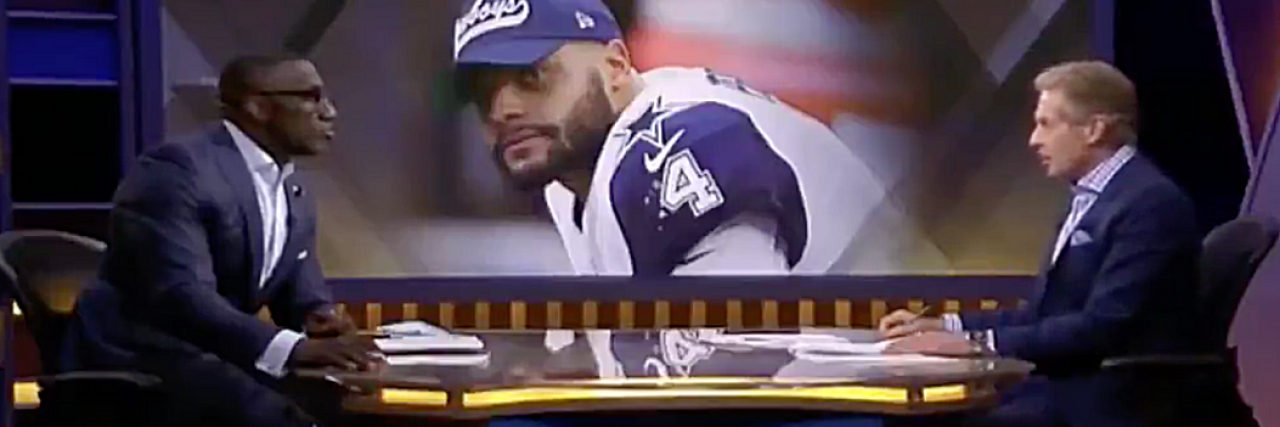Thursday night was the start of the NFL football season with a game between the Texans and last year’s Super Bowl champions, the Kansas City Chiefs. However, the game was almost overshadowed by Skip Bayless, a popular sports analyst on the Fox Sports show “Undisputed,” who made comments attacking Dallas Cowboys quarterback Dak Prescott for publicly speaking about his depression.
“I don’t have sympathy for him going public with ‘I got depressed,’” Bayless said. “You’re commanding a lot of young men. They are looking to you to be their CEO, to be in charge of the football team.”
The comment come after Dak Prescott shared in an interview with Graham Bensinger that he experienced depression earlier in the season because of COVID-19 and the recent loss of his brother to suicide.
“All throughout this quarantine and this offseason, I started experiencing emotions I’ve never felt before,” Prescott said.
“Anxiety for the main one. And then, honestly, a couple of days before my brother passed, I would say I started experiencing depression. And to the point of, I didn’t want to work out anymore. I didn’t know necessarily what I was going through, to say the least, and hadn’t been sleeping at all.”
Prescott also shared that his brother, Jace Prescott, took the passing of their mother, who died in 2012 from cancer, hard. Prescott revealed that Jace helped as a caregiver for their mother during her illness, an experience that can lead to depression.
“It was a huge burden on him, he didn’t know how to share it. He didn’t know how to be vulnerable about it,” Prescott said.
Bayless blasted Prescott for sharing his personal struggles based on his feeling that an NFL quarterback should not publicly display any weakness because of their position of leadership and that football is a tough sport.
Dak Prescott’s brother died in April of an apparent suicide.
Dak battled depression.
Dak showed courage and bravery to maybe help someone who is afraid to speak up.
Skip Bayless has ZERO COMPASSION because Dak plays QB in the #NFL and showing weakness.
Wow.#DallasCowboys pic.twitter.com/EzrhORx65b
— CHRIS TORELLO (@TorelloSports) September 10, 2020
“The sport that you play is dog eat dog, no compassion, no quarter given on the football field. If you reveal publicly any little weakness it can affect your team’s ability to believe in you in the toughest spots,” he said.
Fortunately, Skip Bayless’ cohost Shannon Sharpe, a former NFL player himself, defended Prescott sharing his mental health struggles. “I understand that he plays quarterback, that he’s the face of the franchise, but he’s still human.”
Michael Strahan, another former NFL player turned TV host, also criticized Bayless’ comments on “Good Morning America.” “He’s talking about being a leader and part of being a leader is having guys respect you and they respect you for being honest about what’s going on in your life.”
Bayless’ suggestion that men cannot be strong and confident leaders while also openly discussing their own feelings and struggles with mental health is both wrong and dangerous — but he is not alone in this sentiment. His comments highlight a common attitude in football, a sport considered the pinnacle of (toxic) masculinity with its aggression and “leave it all on the field” style of play. Just as men are supposed to take pain and punishment on the field with no complaints, it is expected that men approach life the same way.
The NFL itself has a troubled history with tackling the mental well-being of its players. The league has actively downplayed the effects of CTE, a deterioration in the brain caused by repetitive head trauma that could be linked to tackling. CTE is believed to lead to depression, change in behavior and, in severe cases, suicide. Famous examples of this include Junior Seau, a probowler who played for the Chargers and Patriots, and the former Patriots’ tightend Alex Hernandez, whose life, murder conviction and suicide was featured on a Netflix documentary.
The belief that being a man means suffering in silence is often internalized by men, making it harder for them to seek help when struggling with depression, anxiety or other mental health ailments. This may be one of the reasons men are underdiagnosed for depression and die by suicide 3.5x more often than women.
Shannon Sharpe stated in rebuttal to Bayless after his initial comments: “You can be weak and not be vulnerable, you can be vulnerable and not be weak.” In his vulnerability, Dak Prescott showed strength and leadership and will hopefully encourage other NFL players, and men overall, to do the same. The idea that men have to deal with pain internally must change. The silence is literally killing us.

